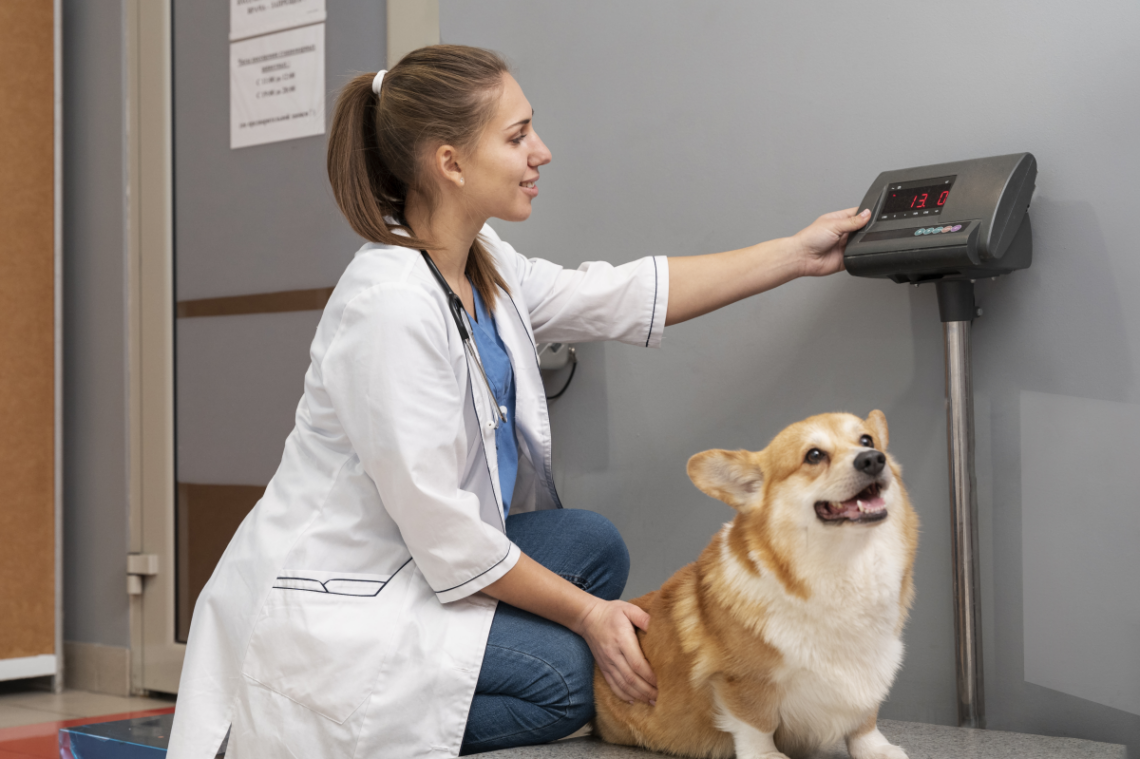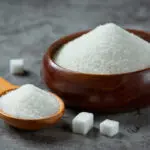(Original Article Published via RawFoodForPets.com)
a Severe and Debilitating Illness!
The most common disease in mutts, pups, nobles, masters and muggles today is obesity. We define obesity as an increase in your pets weight of at least 15% above what would be normal for the size of the pet. As with pet parents, obesity can be the result from an excess intake of calories relative to the expenditure (burn rate) of energy.
Spaying or neutering is often cited as the main reason for obesity, and of course, is an urban myth. Many informed pet parents question the link between spaying or neutering and obesity. Research confirms that the reduction of the male and female hormones does not cause obesity per se. However, if your pets energy levels decline because of neutering or spaying, and if we do not adjust the intake of calories, your pets will become obese.
Obesity is a severe and debilitating illness.
Obesity is a disease of domestication and is the most common nutritional disease in pets and people. With a rare exception, such as a disease like thyroid disease, pet parents and guardians make their pets that way. Mutts, pups, nobles, masters, and muggles are not born that way. In the wild, few animals are obese.
Until recently, it was assumed that the sole purpose of fat (adipose tissue) is to store excess energy and provide insulation for the body. However, more recent studies have shown that adipose tissue is part of the endocrine system. The endocrine system is a chemical messenger system in the body, and in humans, the major glands involved are the thyroid gland and the adrenal glands. Essentially, adipose tissue is an endocrine organ. Hormones and proteins produced by adipose cells, called adipokines, affect many parts of the body. This includes system-wide appetite levels, inflammatory responses, insulin sensitivity, and metabolism.
Many genes traditionally associated with lipid, protein and carbohydrate metabolism does not change in obese dogs when compared to lean dogs. New research indicate that genes pertaining to endocannabinoid metabolism, insulin signaling, type II diabetes mellitus and carnitine transport does however manifest different behaviors in obese dogs. This suggests that increasing body weight is responsible for gene-induced hormonal changes.
While many pet parents and vets often use the pets actual weight to gauge obesity, it is probably more accurate to use a body composition score.
Physical effects of pet obesity
- Joint problems and pain
- Increased risk of diabetes
- Heart and respiratory problems
- Decreased stamina and mobility
- Higher likelihood of surgery complications
- Skin and coat problems
Emotional effects of pet obesity
- Decreased quality of life
- Increased lethargy and lower activity level
- Behavioral issues (e.g. increased irritability)
- Decreased lifespan
- Lower self-esteem for pet owner
Can pet parents prevent obesity?
Keep in mind we make most obese pets that way; they are not born that way. Many pet parents give their pets treats and snacks and feed them whenever they beg for food. These pet parents are setting their pets up for all the future medical problems that can occur with obesity. While many people who constantly reward these begging behaviors believe that they are being kind and loving pet parents, they are killing their pets with kindness, no pun intended.
Problems associated with obesity in pets and people alike are many and include orthopaedic, arthritis, ruptured ligaments, intervertebral disk disease, difficulty breathing, reduced capacity for exercise, and in severe cases, difficulty in movement, heat intolerance, increased chance for complications because of drug therapy, cardiac problems, hypertension, and cancer, to name but a few. Treating obesity requires discipline and dietary changes by pet parents. The diet requires a low-calorie, low-fat nutritional profile with a sensible exercise program. It is however very important that your fur kid receive a blood profile from your vet to rule out other diseases, such as diabetes or hypothyroidism, that may be the cause or contribute to obesity.
What Not to Feed an Overweight or Obese Pet
The solution to obesity is not feeding more of the same, as free feeding McKibble or McCan is one of the top causes of obesity. In fact, avoid feeding any commercial pet feed claiming to be low fat or weight reduction formulas intended for weight loss. This is because of most processed low-fat pet feed containing high levels of carbohydrates (often labelled high-fiber), and typically contain excessive amounts of starches like corn, wheat, rice, potato, or oatmeal, and an abnormal amount of non-digestible fiber, or roughage.
So even though the starches used in these so-called weight loss formulas are low in fat, many of them are high in calories, and excess calories convert to and stored as fat in your pet’s body. The roughage or non-nutritive fiber used in these formulas function as dietary fillers with no nutritional value. The theory behind fiber filled pet feed is that it makes cats and dogs feel full. Excess fiber in your pets diet may make them feel full, but their bodies are not being fooded at the cellular level where it truly counts.
McKibble or McCan with fiber content higher than what would naturally occur in a species appropriate diet blocks the absorption of important nutrients into the small intestine. For our carnivorous cats and dogs, the average level of fiber should be around 8 percent based on current guidelines. Excessive fiber in the diet acts like a barrier, preventing vitamins, trace minerals and and antioxidants from being absorbed. Many commercial low-fat or weight loss formulas contain as much as 27 percent fiber, blocking a tremendous amount of critical nutrients as a result!
Many pet parents report their dogs act more famished on these diet dog feed when fed for a prolonged period, and for good reason. Depriving the body of nutrients will cause feelings of constant hunger. This is because your carnivorous cat or dog is not getting enough protein and other essential nutrients to sustain his or her biology. The constant hunger prompts many mutts, pups and nobles to exhibit pesky begging behaviors. Or attempt to raid garbage cans or open pantry doors, and becoming obsessive about eating anything and everything on walks.
These annoying behaviors prompt many pet parents to feed more food, assuming their pet is starving. The result is a pet that is still fat (and often fatter), but undernourished, which further exacerbates the potential for degenerative disease.
What Food is Appropriate for an Obese Cat or Dogs?
As noted by Dr. Shawn Messonnier, whether your pet is overweight or slim and trim, a healthy, species-appropriate diet for dogs and cats is naturally anti-inflammatory and comprises real, whole foods, preferably raw, organic, and non-GMO. Our super-licious meals include:
- High-quality protein, including muscle meat, organs and bone (protein should make up 75 percent of a healthy dogs diet, and 88 percent of a cats diet);
- Low to moderate levels of animal fat (depending on your pets activity level);
- High levels of EPA and DHA (omega-3 essential fatty acids);
- Vegetables and fruit, pureed;
- A whole food vitamin / mineral supplement that meets the additional E, zinc, iron, copper, manganese, and vitamin D deficiencies often found in home-made diets OR enough of these hard-to-source foods in whole food forms, daily;
- Beneficial additions such as digestive enzymes, super foods and probiotics;
- High moisture content;
- No grains or starches.
Will Real Raw Food Make my Dog or Cat Gain Weight?
In our experience, many our customers have found that a real food diet is extremely effective at helping your overweight dog to lose weight and reach an acceptable weight. It has rarely been reported that dogs have gained excessive weight on the raw food diet. In our experience, if weight gain has been reported we have found that in most instances pet parents were exceeding the recommended daily intake. If you are at all concerned about your dog being overweight or underweight, please refer to a veterinarian who is completely familiar with the biologically species appropriate diets.
Portion Control and Regular Exercise
Along with balanced, species-appropriate nutrition, it is important when fooding any pet, and especially an overweight or obese animal, to practice portion control on a very consistent basis (as in, at every meal). One of the biggest problems we see with pet parents who tell us I am doing everything right, but shes still heavy, is fooding enough calories to sustain his or her current weight, but not fooding for the ideal weight (it is the calorie deficit that prompts the body to burn stored fat).
For most dogs and cats, this means a carefully measured morning and evening meal. And do not forget to factor in any calories from treats, especially any extra bones and chews. Equally important is to make sure your dog or cat exercise regular. An overweight body naturally slims down by taking in fewer calories and burning more energy. To help your pet burn fat, increase muscle tone, and maintain the integrity of her musculoskeletal system, make sure they exercise daily, including at least 20 minutes of consistent aerobic activity.
Other Supplements
Dietary supplements for the obese pet may be helpful. Unfortunately, no magic pills exist that will ensure weight loss in pets. Still, some may contribute to weight loss when used as part of a comprehensive plan.
- Chromium. Chromium is a trace mineral that can increase the bodys sensitivity to insulin. Since decreased sensitivity to insulin can contribute to weight gain, as often happens in diabetic patients, supplying additional chromium can benefit weight control in people. We need more research to determine whether chromium would be of benefit to overweight pets.
- Carnitine. In people, carnitine is recommended to help reduce fat deposits. We need more research to determine whether chromium would be of benefit to overweight pets.
- Boron. This trace mineral may speed up the burning of calories in people. We need more research to determine whether boron would be of benefit to overweight pets.
- Herbs. Herbs, such as cayenne, mustard, and ginger increase metabolism in people and may also do the same in pets. We need more research to determine whether the herbs would be of benefit to overweight pets.
- Hydroxycitric acid. Hydroxycitric acid, also called HCA, is a product extracted from the rind of the tamarind citrus fruit of the Garcinia cambogia tree. It suppresses hunger in people and helps prevent the body from turning carbs into fat by inhibiting the ATP-citrate lyase enzyme. This supplement should be used with a weight-reduction diet and exercise program.
- Chitosan. Chitosan is a dietary supplement made from the outer skeletons of shellfish. It is claimed that this product can bind to fat in the intestines, which prevents the absorption of fat. Studies are inconclusive regarding how well the compound works in people or pets.
Why typical Diet Programs Fail
Despite our best efforts, some diet programs just do not seem to work. As noted by Dr. Shawn Messonnier, reasons include:
- Underlying disease. While an underlying disorder such as Cushings Disease, thyroid disease, or diabetes is only present in 5% of obese dogs, all of our obese pets should be screened for these, and other, diseases. Screening should take place prior to starting a comprehensive weight-reduction program. Failure to do so will cause no weight loss and potentially serious illness or death in the pet with one of these conditions.
- Lack of veterinary involvement. Many owners implement a weight-reduction program on their own without proper veterinary supervision or support. Reasons abound, this is unlikely to work. First, in those rare cases with underlying medical disorders causing or contributing to obesity, the true problem will not be diagnosed, and the diet will not work. Second, many pet parents implemented diet programs comprising the pet parent feeding a lite diet. We know that lite diets are worthless for weight-loss programs. Feeding less rarely results in weight loss for two main reasons:
- Pets who eat less are hungrier, beg more, and ultimately are fed more as pet parents become impatient with the constant begging for food;
- As pets, and people, eat less, their metabolism slows down. Pets who are fed less will adapt to this lower metabolism and maintain weight.
- Fear of starving the pet. Most pet parents do not want to see their pets starve, and we must question if this procedure is humane. Starvation will reduce fat but also burn muscle. People who starve can develop medical complications because of deranged glucose and fat metabolism. While this may not be as much of a problem in dogs, we do not recommend starvation, as significant metabolic problems could arise.
- Impatience. Obesity does not happen overnight, and neither does weight loss. Pet parents must be patient, especially with larger dogs who might require many months of eating a proper diet to slowly lose weight.
As with any condition, the most healthful natural diet will improve the pets overall health. Remember that preventing pet obesity requires a proactive approach and a commitment to your pet’s health and well-being. By taking steps to maintain a healthy diet, prevent overfeeding, and keep your pet active and engaged, you can help reduce the risk of obesity and its related health complications.
Articles and Videos
Good reference articles & videos further reading available at:
- Article by Bruce Y. Lee on Forbes (Forbes);
- Article by the Australian Veterinary Association (AVA);
- The Association for Pet Obesity Prevention (Pet Obesity Prevention.Org);
- The Pet Food Manufacturers’ Association (UK) Info-brochure (PFMA) (requires Adobe PDF Reader);
- Natural Health Bible for Dogs & Cats, by Dr. Shawn Messonnier (Amazon);
Research
- Galic S, Oakhill J, Steinberg G. Adipose tissue as an endocrine organ. Mol Cell Endocrinol. 2010;316(2):129-139. https://www.ncbi.nlm.nih.gov/pubmed/19723556.
- Coelho M, Oliveira T, Fernandes R. State of the art paper Biochemistry of adipose tissue: an endocrine organ. aoms. 2013:191-200. doi:10.5114/aoms.2013.33181
- Komorowski J, StepieH. [The role of the endocannabinoid system in the regulation of endocrine function and in the control of energy balance in humans]. Postepy Hig Med Dosw (Online). 2007;61:99-105. https://www.ncbi.nlm.nih.gov/pubmed/17369778.
- Grant R, Vester B, Ridge T, Graves T, Swanson K. Skeletal muscle tissue transcriptome differences in lean and obese female beagle dogs. Anim Genet. 2013;44(5):560-568. https://www.ncbi.nlm.nih.gov/pubmed/23488938.





